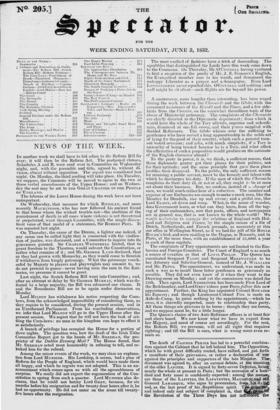NEWS OF THE WEEK.
IN another week we shall have to bid adieu to the Reform Bill for
ever; it will then be the Reform Act. The postponed clauses, Schedules A and B, were read over in Committee on Wednesday night, and, with the preamble and title, agreed to, without di- vision, almost without opposition. The report was considered last night. On Monday, the third reading will take place. On Tuesday, we suppose, the Commons will be moved to agree to the two or three verbal amendments of the Upper House; and on Wednes- day the seal may be set to THE GREAT CHARTER OF THE PEOPLE OF ENGLAND.
The labours of the Lower House during the week have not been unimportant. On Wednesday, that measure for which R0IIILLY, and more recently MACKINTOSH, who has now followed his ancient friend to that house where the wicked trouble not—the abolition of the punishment of death in all cases where violence is not threatened or perpetrated, went through Committee, with -the single dissen- tient voice of that model of a statesman, Sir ROBERT PEEL. It was reported last night.
On Thursday, the cause of the Drama, a lighter one indeed, if any cause can be called light that is connected with the vindica- tion of justice, was discussed, and a Committee to inquire into its grievances granted. Sir CHARLES WETHERELL hinted, that to grant freedom to the Theatres, would subvert the Constitution, or rather what remains of it ; and Mr. GEORGE L Amp declared, that
as they had grown with Monarchy, so they would cease to flourish if withdrawn from kingly patronage. What the patronage vouch-
safed by'MajeSty to players and playwrights may amount to, we do not pretend to guess—never having seen the sum in the Esti- mates, we presume it cannot be great.
Last night, the Scotch Reform Bill went into Committee ; and, after an attempt at delay by Sir GEORGE MURRAY, which was de- feated by a large majority, the Bill was advanced one clause. It and the Boundaries Bill are to be again under discussion on Monday.
Lord MILTON has withdrawn his notice respecting the Corn- laws, from the acknowledged impossibility of considering them, as they require to be considered, during the present session, and in an Unreformed Parliament. From his concluding observations; we infer that Lord MILTON will go to the Upper House after the present session. We regret that he will not have the task of set- tling the Corn-laws: no man in the kingdom can hope to effect it so satisfactorily. •
A breach of privilege has occupied the House for a portion- of three nights. The question was, how the draft of the Irish Tithe Committee Report got to the hands of Mr. SHEEHAN, the pro- prietor' of the Dublin Evening Mail ' The House found, that Mr. SHEEHAN acted most honourably in refusing to tell, and re- buked him for the refusal. .
Among the minor events of the week, we may class an explana- tion from Lord MUNSTER. His Lordship, it seems, had a plan of Reform for the People of England, which would have made them all happy, and which he regrets was not adopted. This is an an- riouncement which comes upon us with all the agreeableness of surprise. We really did not expect the regeneration of the Con- stitution to spring from such a quarter. Lord MUNSTER also de- clares, that he • could not betray Lord GREY, because, for six months beforehii resignation and for twenty4our hours after it, he had no Opportunity. He did not enter on the Some till twenty; lye hours after the. resignation. The most exalted of fashions have a trick of descending. The squabbles that distinguished the Lords have this week come down to the Commons. On Thursday, Mr. O'CONNELL having ventured to hint a suspicion of the purity of Mr. J. E. GORDON'S English, the Evangelical member rose in his wrath, and denounced the unhappy Liberator • as a pauper and a demagogue. Even Lord LONDONDERRY never equalled this. O'CoNNELL said nothing ; and well might lie sit silent—such flights are far beyond his power.


























